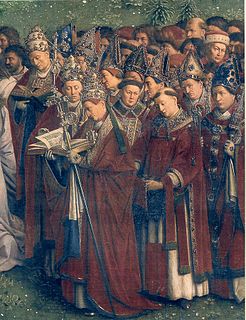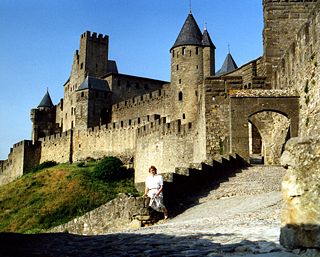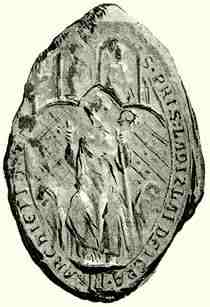Related Research Articles

William of Ockham was an English Franciscan friar, scholastic philosopher, and theologian, who is believed to have been born in Ockham, a small village in Surrey. He is considered to be one of the major figures of medieval thought and was at the centre of the major intellectual and political controversies of the 14th century. He is commonly known for Occam's razor, the methodological principle that bears his name, and also produced significant works on logic, physics, and theology. William is remembered in the Church of England with a commemoration on 10 April.

Pope John XXII, born Jacques Duèze, was head of the Catholic Church from 7 August 1316 to his death in 1334.

The Franciscans are a group of related mendicant Christian religious orders, primarily within the Catholic Church. Founded in 1209 by Saint Francis of Assisi, these orders include the Order of Friars Minor, the Order of Saint Clare, and the Third Order of Saint Francis. They adhere to the teachings and spiritual disciplines of the founder and of his main associates and followers, such as Clare of Assisi, Anthony of Padua, and Elizabeth of Hungary. Several smaller Protestant Franciscan orders exist as well, notably in the Anglican and Lutheran traditions.
The Fraticelli or Spiritual Franciscans were extreme proponents of the rule of Saint Francis of Assisi, especially with regard to poverty, and regarded the wealth of the Church as scandalous, and that of individual churchmen as invalidating their status. They thus claimed that everyone else in the Church was damned and deprived of powers, and the Fraticelli were declared heretical in 1296 by Boniface VIII.
Michael of Cesena was an Italian Franciscan, minister-general of that Order, and theologian. His advocacy of Evangelical poverty brought him into conflict with Pope John XXII.

The magisterium of the Catholic Church is the church's claimed authority or office to give authentic interpretation of the Word of God, "whether in its written form or in the form of Tradition." According to the 1992 Catechism of the Catholic Church, the task of interpretation is vested uniquely in the Pope and the bishops, though the concept has a complex history of development. Scripture and Tradition "make up a single sacred deposit of the Word of God, which is entrusted to the Church", and the magisterium is not independent of this, since "all that it proposes for belief as being divinely revealed is derived from this single deposit of faith."

Ubertino of Casale was an Italian Franciscan and one of the leaders of the Spirituals, the stricter branch of the Franciscan order.
Apostolic poverty is a Christian doctrine professed in the thirteenth century by the newly formed religious orders, known as the mendicant orders, in direct response to calls for reform in the Roman Catholic Church. In this, these orders attempted to live their lives without ownership of lands or accumulation of money, following the precepts given to the seventy disciples in the Gospel of Luke (10:1-24), and succeeding to varying degrees. The ascetic Pope Paschal II's solution of the Investiture Controversy in his radical Concordat of 1111 with the Emperor, repudiated by the cardinals, was that the ecclesiastics of Germany should surrender to the imperial crown their fiefs and secular offices. Paschal proved to be the last of the Gregorianist popes.

Mendicant orders are, primarily, certain Christian religious orders that have adopted a lifestyle of poverty, traveling, and living in urban areas for purposes of preaching, evangelization, and ministry, especially to the poor. At their foundation these orders rejected the previously established monastic model. This model prescribed living in one stable, isolated community where members worked at a trade and owned property in common, including land, buildings and other wealth. By contrast, the mendicants avoided owning property at all, did not work at a trade, and embraced a poor, often itinerant lifestyle. They depended for their survival on the goodwill of the people to whom they preached.
William of Alnwick was a Franciscan friar and theologian, and bishop of Giovinazzo, who took his name from Alnwick in Northumberland.
Francis of Assisi founded three orders and gave each of them a special rule. Here, only the rule of the first order is discussed, i.e., that of the Order of Friars Minor.
Bonagratia of Bergamo was a Franciscan involved in the "poverty of Christ" controversy. As a trained canonist, he supported Michael of Cesena against Pope John XXII.

The Secular Franciscan Order is the third branch of the Franciscan Family formed by Catholic men and women who seek to observe the Gospel of Jesus by following the example of Francis of Assisi. Secular Franciscans are not like the other third orders, since they are not under the higher direction of the same institute. Brothers and sisters of the Secular Franciscan Order profess to their own Rule, and Secular Franciscan fraternities can exist without the presence of the first or second Franciscan Orders. The Secular Franciscan Order was the third of the three families founded by Francis of Assisi 800 years ago.
Francis of Marchia was an Italian Franciscan theologian and philosopher. He was an ally of William of Ockham and Michael of Cesena, and opponent of Pope John XXII, in the struggles of the Franciscan Spirituals, leading to his expulsion from the order in 1329. He was commenting on the Sentences of Peter Lombard around 1320, but no longer closely bound to Lombard; for example he incidentally theorises on projectile motion, views now thought to be taken from Richard Rufus of Cornwall. He was nicknamed Doctor Succinctus.

Papal infallibility is a dogma of the Roman Catholic Church which states that, in virtue of the promise of Jesus to Peter, the pope when he speaks ex cathedra is preserved from the possibility of error on doctrine "initially given to the apostolic Church and handed down in Scripture and tradition".

Jean de Beaune was a Dominican inquisitor in Carcassonne during the early 14th century who played a role in precipitating the Apostolic poverty controversy of the period.

Nicholas of Freising, commonly known as Nicholas the Minorite, was a member of the Franciscan Order during the early 14th Century. He is presumed to be the author of the Chronicle of Nicholas the Minorite, an account of the conflict over Apostolic poverty under the reign of Pope John XXII. The Chronicle was written or assembled as early as 1338.

The Order of Friars Minor is a mendicant Catholic religious order, founded in 1209 by Francis of Assisi. The order adheres to the teachings and spiritual disciplines of the founder and of his main associates and followers, such as Clare of Assisi, Anthony of Padua, and Elizabeth of Hungary, among many others. The Order of Friars Minor is the largest of the contemporary First Orders within the Franciscan movement.

Ladislaus Jánki was a Hungarian Franciscan friar and prelate in the first half of the 14th century, who served as Archbishop of Kalocsa and chancellor of the royal court from 1317 until his death. He was considered a faithful partisan of Charles I of Hungary.
John of Naples, also known as Giovanni Regina, was a Dominican friar and prominent Thomist theologian and philosopher in the early 14th century.
References
- ↑ Melanie Brunner, 'Pope John XXII and the Michaelists: The Scriptural Title of Evangelical Poverty in Quia vir reprobus', Church History and Religious Culture, 94 (2014), 197–226, doi : 10.1163/18712428-09402002.
- ↑ Jones, John D., The Poverty of Christ and the Apostles, PIMS, 1999, Intro p. 2 ISBN 9780888442871